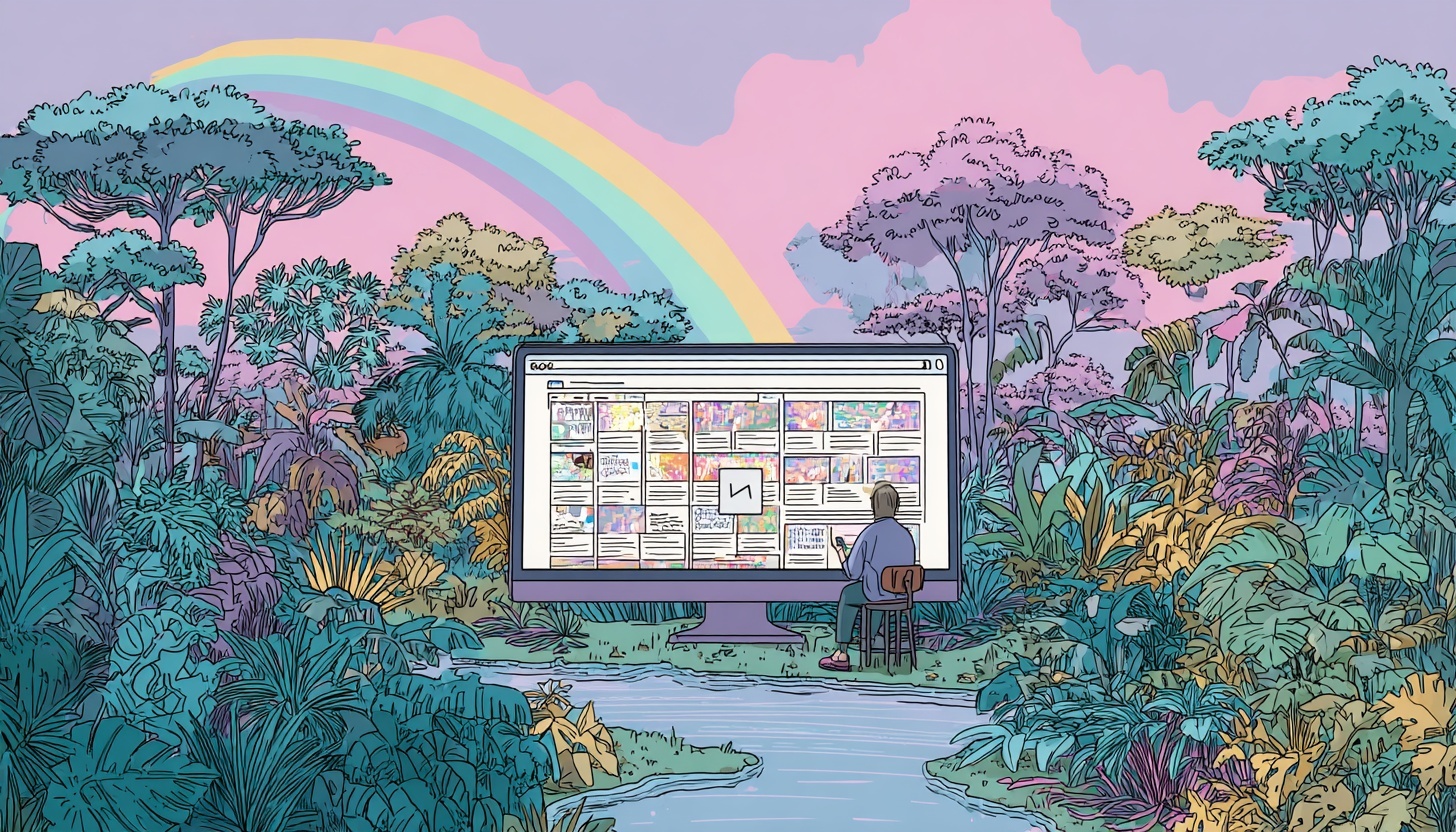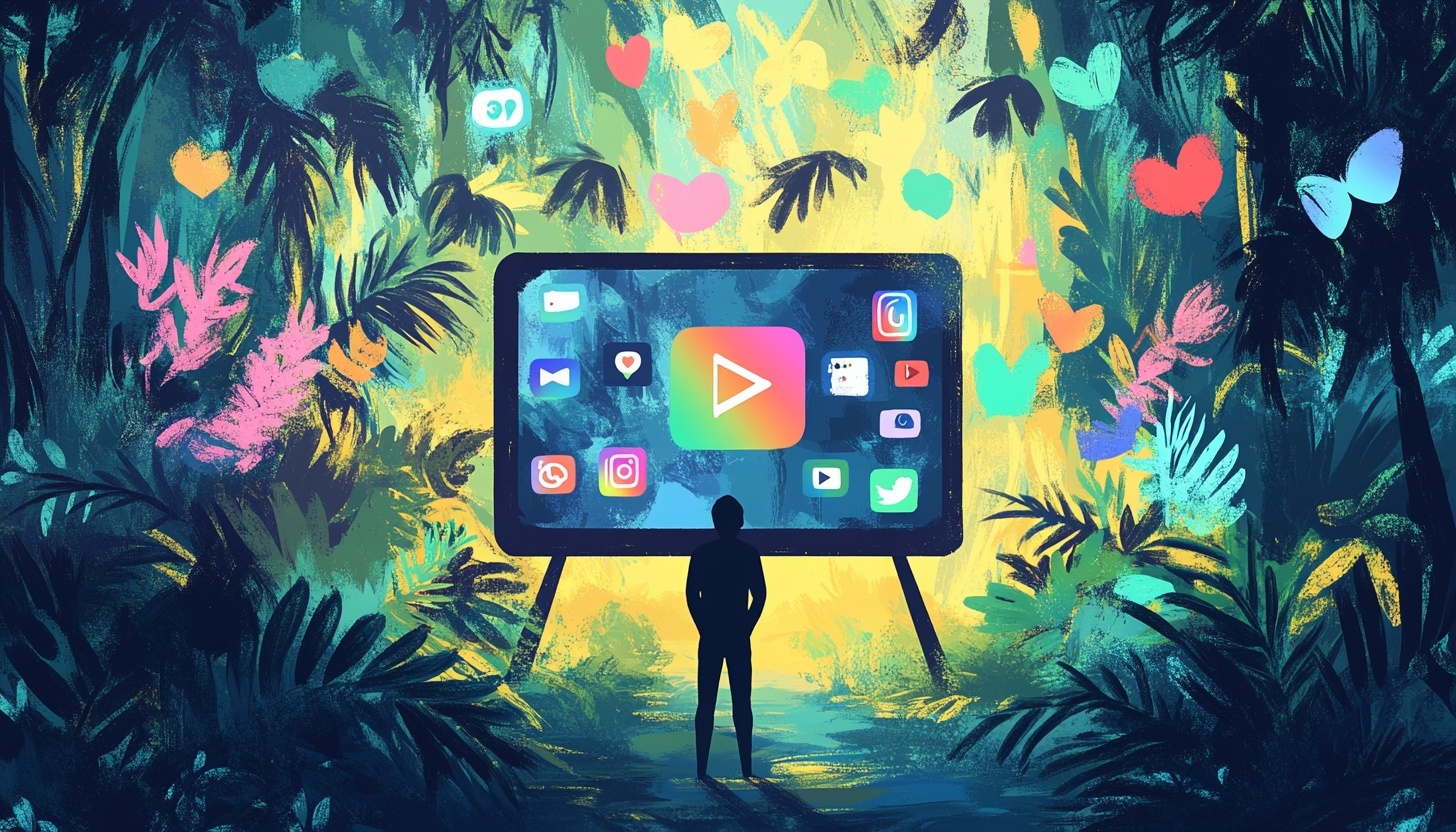Stratégies de monétisation des podcasts : commencez à gagner gros
One of the most common questions we see new podcast hosts ask regardless of their niche is “How do I make money podcasting?” Well, we want to answer this question in the best way possible, so we’ve created a quick podcast monetization guide to try and help you start earning money from your efforts.
We've spent years studying successful podcasters who've turned their passion projects into profitable ventures, and we’re here to tell you that with the right podcast monetization strategies, you can transform your show from a labor of love into a legitimate revenue stream.
Whether you're just starting out or looking to optimize your existing approach, below we’ll walk you through proven methods to start earning from your podcast. From merch to podcast ads, and everything in between, you can monetize without compromising your content integrity or alienating your loyal listeners.
Oh, and you can do it without a bunch of subscribers!
Let's dive in.
Understanding Your Podcast Audience for Maximum Monetization
Before diving into specific podcast monetization strategies, you need to truly understand who's on the other end of those headphones. Your listeners aren't just download numbers or faceless statistics – they're real people with specific interests, pain points, and spending habits that directly influence how successfully you can monetize your content.
Take time to gather demographic data about your audience through surveys, analytics tools, and social media insights.
- Are they predominantly young professionals interested in career advancement?
- Parents looking for educational content for their children?
- Enthusiasts passionate about a specific hobby?
The more you know about who's listening, the more effectively you can match your monetization approaches to their preferences and needs. This can help you pitch your show to advertisers and get more opportunities for sponsorships too.
You could try creating detailed listener personas – fictional characters that represent segments of your audience. Consider factors like age, income level, education, interests, and listening habits.
This exercise might seem tedious, but trust us, it's invaluable when deciding which monetization paths to pursue. A podcast catering to high-income professionals might thrive with premium subscription models, while one targeting budget-conscious students might do better with strategic affiliate marketing.
Pro Tip: Don't be afraid to directly ask your audience what they value about your show and what additional offerings would interest them.
This feedback is gold! Your listeners will appreciate being consulted, and you'll gain critical insights that prevent costly monetization missteps. Remember, the most effective monetization strategy is one that aligns with what your audience already values about your content.
Direct Podcast Monetization Strategies
When most podcasters think about monetization, sponsorships and advertising typically come to mind first – and for good reason. This direct approach to podcast monetization has proven effective for shows of various sizes and genres. According to industry data from AdvertiseCast, the average podcast CPM (cost per thousand downloads) rate is $18 for a 30-second podcast ad and $25 for a 60-second podcast ad, making this a potentially lucrative avenue for podcasters with a growing audience looking to make money
Determining your podcast's advertising value requires understanding both your download numbers and your audience composition. Niche podcasts with highly targeted audiences can often command higher rates even with fewer downloads because they offer advertisers access to a specific demographic that might be difficult to reach elsewhere. Don't undervalue the audience you've built – especially if they fall into a desirable demographic for advertisers!
When incorporating ads into your podcast, you'll need to choose between pre-roll (beginning of episode), mid-roll (middle of episode), and post-roll (end of episode) placements.
Mid-roll ads typically generate the highest engagement and command premium rates since listeners are already invested in the episode when they hear them. However, many successful podcasters use a mix of placements to maximize revenue without overwhelming their audience.
Finding your first sponsors might seem daunting, but there are multiple paths to explore. Podcast advertising networks like AdvertiseCast, Ad Results Media, and Midroll connect podcasters with advertisers willing to pay for access to their audience. These networks typically require a minimum number of downloads per episode (often around 10,000), so newer or smaller shows might need to pursue direct relationships with potential sponsors instead.
Start by researching brands that align with your content and audience, then craft personalized pitches highlighting why your podcast would be an effective marketing channel for them.
Dynamic ad insertion technology is also becoming a prevalent option among podcast hosting platforms. It has revolutionized podcast advertising by allowing for programmatic placement of ads that can be updated or changed over time.
This flexibility means that even your back-catalog of episodes can generate revenue as new listeners discover them, rather than featuring outdated promotions. As your podcast grows, exploring this option can significantly boost your advertising revenue while reducing the manual work of securing and implementing new sponsor deals.
Cultivating Indirect Monetization Pathways
Beyond direct advertising, successful podcasters diversify their revenue through indirect monetization strategies that leverage their audience's trust and engagement. Affiliate marketing stands out as a particularly accessible option for podcasters at any stage of growth.
Unlike sponsorships that might require minimum audience sizes, affiliate programs allow you to earn commissions by promoting products or services you genuinely use and recommend.
The key to effective affiliate marketing is authenticity. Your listeners tune in because they value your perspective and trust your recommendations. Betraying that trust with ill-fitting product endorsements can damage your reputation and ultimately reduce your earning potential.
We always advise podcasters to personally test products before promoting them and to be transparent about their affiliate relationships. This honesty builds credibility with your audience while still allowing you to monetize your influence.
Popular affiliate programs among podcasters include Amazon Associates, Audible, and industry-specific options relevant to your podcast's niche. When promoting affiliate offers, integrate them naturally into your content where they provide genuine value to listeners.
For example, if you host a cooking podcast, mentioning the specific blender you use (with an affiliate link in your show notes) feels much more authentic than a forced promotion for unrelated products.
Developing complementary products and services is another powerful indirect monetization strategy. The intimacy of the podcast medium creates a strong connection with listeners that can translate into enthusiasm for merchandise, books, courses, or consulting services that extend your podcast's value.
Many successful podcasters have found that branded merchandise not only generates revenue but also turns listeners into walking advertisements for their show. From t-shirts and mugs to more creative offerings that reference inside jokes or catchphrases from your podcast, merchandise helps listeners display their affiliation with your content community.
If your podcast establishes you as an expert in a particular field, consider offering consulting or coaching services that allow listeners to benefit from your knowledge in a more personalized format. Alternatively, you might develop online courses or workshops that expand on topics covered in your podcast. These higher-ticket offerings can generate substantial revenue even with a relatively small number of conversions from your listener base.
Building Premium Content Models for Dedicated Listeners
As podcast consumption has matured, listeners have demonstrated increasing willingness to pay for exclusive content from their favorite creators. Premium content models offer a direct way to monetize your most dedicated fans while providing them with additional value they can't get from your free offerings.
Creating a successful premium content strategy starts with understanding what exclusive content your audience values enough to pay for. This might include ad-free versions of your regular episodes, bonus episodes that dive deeper into popular topics, early access to upcoming content, or behind-the-scenes material that offers a more personal connection to you as a creator. According to research by Morning Consult, 30% of frequent podcast listeners already subscribe to a paid podcast service, indicating significant potential for this monetization approach.
Implementing a tiered subscription model can maximize revenue by offering different levels of access at various price points. A basic tier might include ad-free episodes, while higher tiers could add exclusive bonus content, access to a private community, or even personalized interactions with you as the host. Platforms like Patreon, Apple Podcasts Subscriptions, and Spotify's subscription options make it relatively straightforward to set up these payment structures, handling the technical aspects of content delivery and payment processing.
When developing a premium content strategy, maintain a delicate balance between your free and paid offerings. Your free podcast serves as an entry point for new listeners and should remain valuable enough to attract and retain an audience. Think of it as your storefront – the premium content represents products inside that only some visitors will purchase. The most successful premium content strategies complement rather than cannibalize the free podcast experience.
Leveraging Listener Support Systems
The special relationship between podcasters and their audience creates unique opportunities for direct financial support that might not be available to other types of content creators. Listener support systems tap into the community aspect of podcasting, allowing your audience to financially contribute to your show's sustainability because they value what you create.
Crowdfunding platforms like Patreon, Buy Me a Coffee, and Ko-fi have transformed how creators receive financial support from their audience. These platforms facilitate recurring donations or one-time contributions in exchange for recognition, exclusive perks, or simply the satisfaction of supporting content they enjoy. Successful podcasters on these platforms emphasize transparency about how contributions are used – whether covering production costs, enabling more frequent episodes, or providing income that allows the host to dedicate more time to the podcast.
When establishing a listener support program, clearly articulate why you're seeking contributions and how they benefit the podcast. Listeners respond most positively when they understand the concrete impact of their support. Create compelling patron rewards that acknowledge contributions without requiring excessive additional work on your part. These might include shoutouts during episodes, access to a private community, or exclusive digital content that can be produced alongside your regular podcast workflow.
Live events and podcast tours represent another exciting way to generate revenue while strengthening your connection with listeners. Whether virtual or in-person, these events allow you to monetize your podcast through ticket sales, merchandise purchases, and potential sponsorships. They also create memorable experiences that deepen listener loyalty – fans who attend a live recording or meet you in person often become your most dedicated supporters and ambassadors.
The key to successful live events lies in offering something unique that listeners can't get from regular episodes. This might include interactive elements, guest appearances, or performance aspects that showcase talents not fully expressed in your audio-only content. Even smaller podcasts can experiment with virtual events that require minimal upfront investment while testing audience interest in more immersive experiences.
Scaling Your Podcast Revenue
Once you've established effective monetization channels, the next challenge becomes scaling your revenue without proportionally increasing your workload. Strategic growth requires thinking beyond individual episodes to develop systems and assets that generate income more efficiently.
Expanding your podcast into a network represents one powerful scaling strategy. By launching additional shows under your brand umbrella, you can leverage your existing audience and production expertise to create new revenue streams.
These additional podcasts might target different segments of your audience, explore related topics, or feature other hosts while maintaining connection to your central brand. Cross-promotion between shows helps grow the total audience across your network, creating more valuable advertising inventory and listener support opportunities.
Converting your podcast content into additional formats allows you to reach new audiences and monetize your intellectual property multiple times. Many successful podcasters have transformed their episodes into books, online courses, or video content that generates revenue independently from the original audio. This repurposing strategy maximizes the return on the research and creativity you've already invested in your podcast content.
Tools like Castmagic can dramatically accelerate this repurposing process. This AI-powered platform automatically transforms your podcast episodes into a variety of content assets including show notes, timestamps, articles, email newsletters, social media posts, quotes, clips, and more.
With plans starting at $19/month for 300 minutes of audio processing, Castmagic can help you create dozens of content pieces from a single episode, including exclusive content, expanding your reach across platforms while saving hours of manual work.
The platform supports 60+ languages and integrates with popular hosting platforms, making it accessible for podcasters at any stage of growth. By leveraging such automation tools, you can focus more energy on creating great episodes while still maintaining a robust content marketing strategy that drives audience growth and monetization opportunities.
For podcasters with substantial archives, creating compilation products from existing episodes can provide additional value to listeners while generating new ways to make money from your podcast.
These might include "best of" collections, themed series that curate episodes around specific topics, or enhanced versions of popular episodes with additional commentary or updated information. The beauty of this approach is that it primarily relies on content you've already created, requiring relatively little additional production effort.
Avoiding Common Monetization Mistakes
As you implement various podcast monetization strategies, be vigilant about potential pitfalls that could undermine your long-term success. The most dangerous is allowing monetization to compromise your content quality or authenticity – the very foundations that attracted your audience in the first place.
Warning signs of over-commercialization include declining engagement metrics, negative feedback about ad frequency, or finding yourself prioritizing sponsor requirements over listener experience. Remember that your primary obligation is to your audience; without them, no monetization strategy can succeed.
We've seen too many podcasters chase short-term revenue at the expense of long-term sustainability. Trust us, maintaining editorial integrity while pursuing revenue is not just ethically sound – it's good business.
The administrative aspects of podcast monetization can quickly become overwhelming without proper systems in place. Establish clear accounting practices to track revenue across different channels, understand tax obligations related to your podcast income, and consider forming appropriate business entities as your revenue grows. Many podcasters find it worthwhile to consult with financial professionals who can help optimize the business structure around their growing podcast enterprise.
La gestion du temps devient de plus en plus cruciale à mesure que la monétisation de vos podcasts se diversifie. Trouver un équilibre entre la création de contenu et le développement commercial nécessite une planification intentionnelle et parfois une délégation. Réfléchissez aux tâches qui nécessitent réellement votre attention personnelle et à celles qui peuvent être externalisées ou automatisées en fonction de votre budget. L'objectif est de créer un fonctionnement durable qui n'entraîne pas l'épuisement des créateurs, un sort courant pour les podcasteurs qui réussissent à monétiser mais ne parviennent pas à adapter leurs flux de travail en conséquence.
Création d'un plan d'action pour la monétisation de vos podcasts : prochaines étapes vers la réussite financière
Alors que nous terminons cette exploration des stratégies de monétisation des podcasts, il est temps de transformer les connaissances en actions. La rentabilité des podcasts n'est pas universelle : votre approche optimale dépendra de votre contenu, de votre audience, de votre niveau d'expérience et de vos objectifs personnels. Commencez par évaluer honnêtement la situation actuelle de votre podcast et les ressources que vous pouvez consacrer de manière réaliste aux efforts de monétisation au cours des prochains mois.
Pour les nouveaux podcasteurs, concentrez-vous d'abord sur la création d'un contenu cohérent et de haute qualité qui attire un public dévoué. Tout en développant votre base d'auditeurs, expérimentez des méthodes de monétisation à faible barrière, telles que le marketing d'affiliation ou les produits de base. Ces approches vous permettent de commencer à générer des revenus sans exigences d'audience minimales, tout en découvrant ce qui trouve un écho auprès de votre communauté croissante.
Les podcasteurs les plus établis devraient auditer leur mix de monétisation actuel par rapport aux stratégies décrites ici. Laissez-vous de l'argent sur la table en négligeant les chaînes prometteuses ? Pourriez-vous optimiser les flux de revenus existants grâce à un meilleur ciblage ou à une meilleure mise en œuvre ? Envisagez de sonder votre public pour connaître ses préférences concernant les différentes options d'assistance. Leurs commentaires peuvent révéler des opportunités inattendues.
N'oubliez pas que la monétisation durable des podcasts combine généralement plusieurs stratégies complémentaires plutôt que de s'appuyer sur une seule source de revenus. Les podcasteurs les plus prospères sur le plan financier ont diversifié leurs sources de revenus afin de créer une stabilité face aux fluctuations du marché et aux changements de plateforme. Commencez par des approches qui correspondent à votre émission et développez-les méthodiquement au fur et à mesure que vous gagnez en confiance et en expérience.
Enfin, engagez-vous à revoir et à optimiser régulièrement votre stratégie de monétisation. L'industrie des podcasts continue d'évoluer rapidement, ouvrant de nouvelles opportunités tout en fermant parfois d'autres. En vous tenant au courant des tendances du secteur et en maintenant un lien étroit avec les besoins de vos auditeurs, vous pouvez adapter votre approche afin de maximiser à la fois les rendements financiers et la satisfaction du public.
Votre podcast représente une propriété intellectuelle précieuse et un lien puissant avec un public engagé. Grâce à une mise en œuvre réfléchie des stratégies dont nous avons discuté, vous pouvez transformer cet actif en revenus significatifs tout en continuant à créer du contenu qui vous passionne. Maintenant, allez-y et commencez à gagner ce que votre podcast mérite vraiment !
Et, si vous voulez essayer Castmagic pour réutiliser votre audio actuel, cliquez ici pour commencer gratuitement.
Start Repurposing Media with Castmagic
Paste a link from:









Place a link to 1 media file below and get 100+ content assets instantly.
Castmagic transforms your audio and video into blogs, social posts, newsletters, show notes, and more.
Start Repurposing Your Media

Click or drag your audio/video file here
One upload. Generate endless content.
1. Upload Media File: Drag and drop your audio or video file.
2. Get Instant Transcript: 99% accurate, perfectly formatted, speaker-labeled transcripts in 60+ languages.
3. Generate Content: Create publish-ready blogs, social posts, newsletters, and more with AI.

Automate Your Content Workflow with AI










